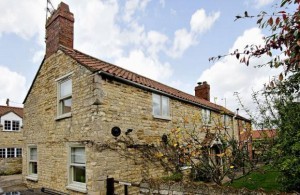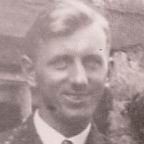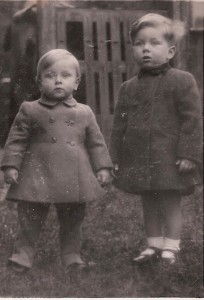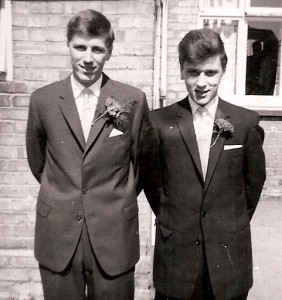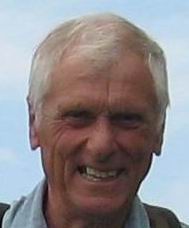My Footballing Cousin
The Early Kick-off.
Sporting fragments from John Waite’s childhood recalled by Clive Hutchinson.
My cousin, John Waite, was born at Old Oak Cottage, his maternal grandparents’ house in Wellingore, Lincolnshire, in January 1942, in the same bedroom where I – the son of his mother’s youngest sister – was born four months later.
Perhaps it was destiny that John was to become a top class footballer. His mother’s family, the Steels, were of hardy farming stock, tough in body and mind. Jessie’s four brothers all played football in the local leagues: Charles the youngest, an even-paced half-back; Isaac, “Ike”, a nippy winger; Walter, a rumbustuous centre-forward; and John, “Jack”, a centre-half colossus and local football legend. Jack was a superb footballer, well-built and strong, swift off the mark, a ferocious tackler and powerful header of the ball, fiercesome on the pitch and quiet and gentle off it. His services were always in demand by the top local teams and he turned down approaches from professional league clubs including Barnsley, then in the top division. During the Second World War, he played in Army representative teams from time to time when active service permitted.
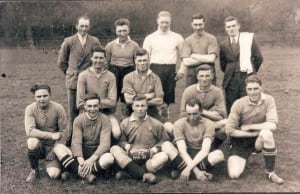
Granny and Grandad Steel said that young John took after ‘Our Jack’ – centre middle row in Wellingore FC 1934-35. His brother Walter is centre front row. It wasn’t just footballing skills. Some saw a physical resemblance. CLICK TO ENLARGE.
Added to this were John’s sporting genes inherited from his father, Reg Waite, son of the headmaster of Wellingore School. Tall, athletic and unassuming, he had an active sporting life as a young man and a life-long enthusiasm for sport, in particular, football. At my school in Grantham, in the fifties, I came across some old and dusty copies of the Lincoln School magazine. Flicking through them, I saw reports of the school’s cricket team in which R Waite regularly figured.
So the scene was set . . .
Being cousins, sole children and of the same age, it was inevitable that our paths crossed frequently in childhood. Many memories still remain of this time, the first one of a stay with Auntie Jess and Uncle Reg in Leeds with a visit to a show at the City Varieties.
John and his parents would come and stay with our grandparents in Wellingore during school holidays. Happy days walking in the fields and woods with Uncle Reg. Playing “Pooh sticks” at the Running Waters and wandering in Pingle Wood, visiting our favourite trees, the Big Tree, the Sugar Tongue and the Baler. Granny’s big family Christmas parties. A fireworks night on the village green. My school holiday visits to Auntie Jess’s in Clifton Road in Grimsby. Playing on the “Backs”. Rowing a whaler in the docks. Going for a swim in the sea at Fuller Street. Saturday morning flicks. Reading Stanley Holloway stories together.
Later on, train spotting (“cops” and “stinks”) at Grimsby, Retford and Grantham stations. Bike riding together with our cousin Beryl. A holiday in Scarborough with John and his parents.
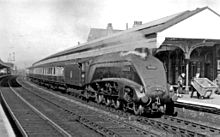
John and Clive went trainspotting at Retford railway station. This picture shows the Up Leeds Express passing through, 1954, when they’d be eight.
Threaded though all this was football…
Hilton’s Paddock
The first time I realised that John was good at football was in Hilton’s Paddock at Wellingore when we could only have been five or six years old. At that time we wandered together freely around the village in search of adventure. On this occasion we had gone to look for windfalls from the walnut trees. Some older boys were playing football with coats and jumpers as goalposts. So we stood behind the goal to retrieve out-of-play balls, kicking them back to the big boys. Whereas, when I kicked this big leather ball, I either scuffed it or my foot bent like plasticine against it, John would hit it with a resounding thump either along the ground or into the air. One of the older boys said, “Hey kid, you’re good. Come and play with us.”
The tennis ball
During John’s stays in Wellingore, wherever we wandered, an old tennis ball would appear. Along the pavements and in the road, we would dribble the ball, trying to get it off each other…..or should I say, I would try and get the ball off John! Heads down, waltzing around each other, we would work our way up the street. John would present the ball to me at his feet inviting the tackle. I would lunge in only to find the ball and John had gone, ending up behind me with the ball under his foot. Sometimes the ball went one way and John the other.
Wellingore kickabouts
On Sunday mornings in the fifties, local youths and younger children would gather for a kickabout on the football field. Two teams were picked or as we arrived, we were drafted into a side. When in Wellingore, John would join in with this motley squad some dressed in overalls, cord trousers and some in Wellington boots. I was quietly amused how the bigger lads became more and more confused and desperate as John danced round their clumsy tackles and body charges.
The school football match
At Wellingore School, we played football on a Wednesday afternoon on the village football pitch under the watchful eye of the head teacher. One such Wednesday when we were about ten years old, John happened to be in Wellingore and so I asked the headmaster if my cousin could join us on the football field. Of course, with pleasure. Out came the teacher to the waiting boys, kicking the ball high into the air. Almost by instinct John ran under the arcing ball and trapped it. The teacher stared, gathered his composure and gathered us around. “Right! This is how you trap a ball,” he said, kicking the ball skyward again. John duly trapped the ball again with consummate ease.
As it so happened, we were due to play a friendly match against Skellingthorpe school the following Saturday. Our teacher asked John if he would like to play for the school team and if so what position would he like to play. John chose to play centre half, declaring that he preferred playing in that position rather than centre forward because, as he put it, it would mean less responsibility . . .
I can still see in my mind’s eye from where I played on the left wing, John bestriding the game in a white shirt and black shorts, bringing the ball forward with the opposition in his wake. I cannot remember the result now but I think we must have won!
Grimsby kickabouts
During my stays at Clifton Road in Grimsby, the tennis ball routine, like a gyrating tribal dance, continued wherever we went, laced with happy laughter. I would join John and other local boys for the regular kickabout on the “Backs”, waste ground behind Clifton Road. Sure enough, there was John as ever gliding through tackles and more often than not, laying the ball off for lesser mortals to score. On one occasion, a rather oafish thickset young man joined in. I was warned to be careful because he was on the Town’s books as a centre half and he tackled for real. He certainly did and not always in the spirit of the game but he could not get near John for all his foul-mouthed swagger.
Up the Mariners
From an early age John was an avid fan of the Town and went to support them at Blundell Park. I once went with him to watch Grimsby play Leyton Orient (Vic Groves was their star player) in the old Division Two. John could give chapter and verse on the Town players: the ones I remember of that era were Ray de Gruchy, a Channel Islander full back who had never scored a goal, and the captain Allenby Chilton, ex-Manchester United.
Once, John joined me, a Lincoln City supporter, at a packed Sincil Bank for a derby match between Lincoln and Grimsby. What a superb game it turned out to be, ending in a four-all draw. Georgie Hannah starred for the City and Ronnie Rafferty for the Town. Little did we know that, a few years later, John would be playing alongside Rafferty and some of his other heroes.
Perfect balance and eye to hand coordination
Other sports did not seem to present John with any difficulty either.
Take tennis. One summer in Wellingore, John joined our cousin Beryl and me for a game or two of tennis at the village lawn tennis courts. He declared that he had never played tennis before. So, I thought, this is where the tables are turned. But no! He hit the ball as though he had been playing for years: middle of the racquet overhead smashes, the ball coming back like an aspirin from his volleys and his ground strokes spitting off the grass. “Good game this. I rather like it,” he said afterwards, without a hint of mockery.
Take cycling. His father and I waited for John to arrive in Wellingore at the end of his maiden cycling trip from Grimsby. He sped down the road towards us, hardly out of breath and with an easy smile on his face.
Take swimming. John’s father taught him to swim in the sea off Fuller Street in Grimsby. Uncle Reg always considered the sea a healthier alternative to the town indoor swimming pool! I joined them on one occasion. By this time, John was swimming like a fish, arms scything into the water. In fact he spent most his time that day “submarining”. Once out of the water, he told me that that was the end to his swimming career because swimming would adversely affect his football muscles.
Take running. As kids, if we were not playing football with a tennis ball, we would run, to the shops, in the fields and the streets. John would be almost out of sight with me shouting, “Wait for me!” Later he would excel at athletics at grammar school, the feats of which are recounted elsewhere.
Take pillow fighting. As kids we would have pillow fights when I stayed at my auntie’s in Grimsby. At first, it was measure for measure then John would up the game and I was hammered into the mattress. All with shrieks of laughter and feathers everywhere much to Auntie Jess’s chagrin.
I never saw John play cricket which was his other sporting love but I do know that he played for Lincolnshire Colts and saw his name sometimes in the Lincolnshire Echo. Once, if my memory serves me correctly, he took 10 wickets in an innings or a match playing for the Colts.
Once we had both gone to our differing grammar schools, our lives went in other directions and we saw less of each other but I regularly heard of his sporting exploits at school and on other playing fields which are related elsewhere.
England Youth Team
Granny and Grandad Steel often declared, as we grew up, how much John was like “our Jack.” So it came to pass that John as a young man achieved one of the highest honours in the game of football: he was selected to play for the England youth team. Arguably something his Uncle Jack could have achieved a generation earlier given the same opportunity, encouragement and circumstances.
John’s England team-mates were players who would go on to achieve great things in the professional game – Terry Venables, Frankie Saul, David Wagstaff, Martin Peters, I believe.

Martin Peters, second from right, as England win the 1966 World Cup. John had played alongside Peters.
The story goes that John as the right winger played in the same number seven shirt in which the great Stanley Matthews had played in a recent international game. Even international shirts were washed and re-used in those days.
The next time I came to Grimsby after the tournament, John let me wear his England cap!
Grimsby Town FC
I think it is true that John’s overriding passion has always been football. As a youth, I believe his parents were approached by several first division league clubs (West Brom?, Aston Villa?) to allow John to join them on apprentice professional forms but I guess his parents felt it was more important for him to continue his education at grammar school.
I remember concerned family faces in Wellingore when at 18, John returned home, disheartened, a week or so into his course at St John’s College in York. John so desperately wanted to play professional football and clearly was good enough. What went on at that time at Clifton Road, only John knows, but soon after, he signed on as a part-time professional for Grimsby Town and successfully applied for a job in personnel with Lindsey Oil, a huge refinery on Humberside.
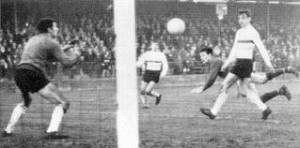
John would cross the ball to Grimsby Town legend Ron Rafferty, scoring here with a typical flying header
His career with the Mariners is better detailed elsewhere. I never saw John play for the first team but I followed his progress from afar and read and heard about his wonder goal . I vaguely remember going to see him play in the reserve team at Blundell Park but that is all. I also believe his leg was quite badly injured playing for the reserves against Port Vale Reserves – a club which at that time had a reputation for being “cloggers”.
Gainsborough Trinity
His footballing career at Blundell Park effectively ended with a change of management there. The incoming manager did not want part-timers. So it was decision time and John chose a career outside football, I suspect, for family reasons and in those days football did not pay too well.
Not that his passion for the game was in any way diminished. I remember that once when we were together, he spotted an advertisement in a local paper, maybe the Lincolnshire Echo, stating that Gainsborough Trinity of the Midland League was looking for players. So began his career with Gainsborough Trinity. I went to see him play for the Trinity away against Grantham Town. His ever-present supporter, his father and my Uncle Reg, was there as well.
That day, John was still plying his trade as a fast right winger whose excellent crosses and corners were varied in their execution – fast and pinging on a low trajectory or hanging and spinning at the far post. However, in the first half, he did not always have the beating of the Grantham left back who was having a good game. Cue father. At half-time, John’s Dad managed to have a word with him. “Take the ball up closer to him before making your move.” Different story second half!
From the touchline
The above recollections are but a few dog-eared cigarette card memories of my closest cousin John which nevertheless may add some colour to his early sporting days.
As a young man, he was my sporting inspiration and although I did not excel at sport having a small frame, ten to two feet and limited coordination, I shared his passion for football which has never left me as I am sure it has never left John. I always wanted to be good at sport like John and on a few occasions I was near to tears with frustration, but not with envy, when playing sport. And then in my thirties, I discovered that I could run long distances and that I was a spring heeled jack rabbit in the mountains. So, fell-walking became my over-riding passion. Then, irrational as it may seem, at last did I feel an equal to John, out on my own rugged playing field.
More recently, I asked John if he would have fitted into modern football game. Without hesitation, he replied that the game had changed so much that in today’s game, simply as a fast direct winger, he would not have made the same mark that he did in his time. He continued that his son Mark, who also played for Grimsby, was a better player than himself, more suited to the modern game.
In my recollections of John above, I have only briefly touched on his character. In spite of the vast difference in our sporting abilities, he always treated me always the same – as his cousin and friend. There was neither arrogance nor scorn but a simple, quiet self-effacing modesty.
Perhaps I may finish with the pithy comment heard from time to time: “It makes you sick, doesn’t it! He’s not only bloody good at sport but he’s a nice guy as well!”
Clive Hutchinson
Flitholme
Cumbria
September 2013
For more on John Waite go to our article This Sporting Life: John Waite at https://www.minchinsofbourton.co.uk/2013/08/24/this-sporting-life-john-waite/

